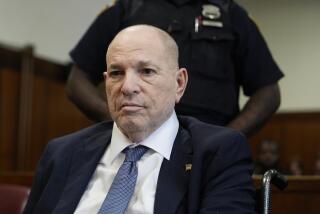Wei Jingsheng Being Treated at Detroit Hospital
- Share via
DETROIT — The trip that Wei Jingsheng once vowed he would never make ended Sunday at Detroit’s Henry Ford Hospital, where China’s most famous dissident was admitted after a journey that freed him from prison but removed him from his native land.
Granted medical parole from a 14-year sentence, his second prison term, Wei is being treated for hypertension and evaluated for other health problems. A preliminary exam indicated he was in “fair but stable condition,” said Thomas C. Royer, the hospital’s chief medical officer.
The White House requested about 1 a.m. Sunday that Wei be admitted, said a spokeswoman for the hospital, which is known for its expertise in heart disease, cancer and organ transplants. A lung specialist, John Popovich, heads the team treating Wei.
The famous patient walked into the hospital without assistance, Royer said.
A videotaped interview with Wei, 47, that was screened at a July tribute in Los Angeles shows him insisting he would remain in his homeland, where he had spoken out boldly for democratic change. A friend has written that he rejected an earlier freedom-for-exile bargain.
But less than two weeks after Chinese President Jiang Zemin returned from a state visit to the U.S.--facing barbs about human rights from protesters and from President Clinton--Wei boarded Northwest Airlines Flight 88 in Beijing with a U.S. Embassy nurse as his escort.
When the plane finally took off an hour and 25 minutes late, he received VIP treatment that must have offered a stunning contrast to the years of hunger, illness, sleepless nights and sanctioned beatings that he and his family have described in published writings.
Wei dined on steak in the 18-seat first-class section of the Boeing 747 during the 13-hour trip. On his arrival at Detroit Metropolitan Airport at 10:38 a.m., hundreds of other passengers waited to disembark while U.S. Customs officers came to process Wei at his seat.
Then he was whisked across the tarmac in a van, out of reach of reporters, photographers and hero worshipers in the international terminal.
Detroit apparently was the destination of choice because Northwest operates direct service from Beijing, without the Tokyo stop required to get to most other American cities. “We wanted to get him to a high-quality health facility as quickly as possible,” said Elaine McDevitt, a U.S. State Department spokeswoman.
Fellow first-class passengers said Wei did not appear ill. But he has complained of heart and blood pressure problems.
The courageous outspokenness that sent him to prison in China won him admirers in the U.S. Some made long pilgrimages to the airport.
Paul Xiong, for example, said he couldn’t sleep after hearing the news of Wei’s release on television late Saturday night. He and his wife, Min Jiang, both natives of China, left their home in Buffalo Grove, Ill., at 4:30 a.m.
They drove for six hours, arriving just in time to watch everyone but Wei filter through the customs exit door.
They didn’t mind so much. “I just want to show my respect for him,” Xiong said. “I’ve been watching this man since 1978, when he was posting his big posters in Beijing.”
The couple were not alone. A Colombian studying Chinese at Washington University in St. Louis read about the release on the Internet. Hours later, he left St. Louis on a Detroit-bound plane.
“I had to come,” said the student, who identified himself only by his first name, Al. “I had to.”
Chinese activists flew out from New York. Liu Qiug, also a former political prisoner who said he met Wei in 1978, said he believed that the release saved Wei’s life.
But he noted that it did not herald a major shift in China’s policy. “This is not a sign of improvement,” said Liu, chairman of the New York-based group Human Rights in China. “This is another way to erase another voice for freedom in China.”
The group’s executive director, Xiao Qiang, agreed. Wei’s apparent exile “is in fact another form of persecution,” he said.
Despite all the special treatment, some aboard Flight 88 simply didn’t recognize Wei. “Most young Chinese men don’t know him,” said a 26-year-old on a business trip. He gave his name from English class: Johnson. “There are more important things to think about, like economic development.”
Even some of Wei’s sympathizers were surprised. “Thank you for this good news,” said Ling Thumin, a native of China who has lived in the U.S. for nine years.
More to Read
Sign up for Essential California
The most important California stories and recommendations in your inbox every morning.
You may occasionally receive promotional content from the Los Angeles Times.










